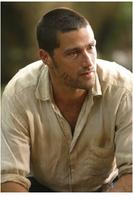
LOOOSSSSTTT. You have to say it in a dragged-out half-sigh, it is that good. Lahhsst.
I’ve been threatening to write a tribute post about my favorite show, and now I’m doing it. Actually, this will probably end up being more like "LOST, Part 1".... I watched the season premiere the other night…WOW. It’s like, it went away for the summer, and I actually started to forget how completely and utterly addicting it is.
This reaction, I think, alarms some people. Even my family, who all enjoy the show as well. I admit I am perhaps more than a trifle obsessed. I look for clues and hints in everything. But as with all my real “obsessions” there is a good reason for it. I don’t like LOST just because the acting is fabulous, it’s brilliantly written, and the story keeps you desperate for more. It goes deeper than that, I assure you. But I’m warning you, if you want to know, and you continue reading, you are venturing into deep waters. Most people don’t go as deep as I do. But…it’s what I do.
Speaking of that—how I look for meaning in things—I got into an argument with this guy on my art site about this very topic. He was going off about how art doesn’t have meaning, it’s just a display of talent and beauty and stuff like that. He was so arrogant that it really peeved me off. I don’t care if you don’t agree with me, but he had that “well I’m right” attitude. Well, no, he wasn’t. Art in all forms can have meaning. Key word: can. Does all art have a deeper meaning? No, probably not. But sometimes that’s in the eye of the beholder. He even went as far as to say that he just dislikes people who look for deeper meanings. This shouldn’t bug me, because I really couldn't care less whether he like me or not. But on some level, it does irritate me. I’ve just come to realize in the past couple of years that “looking for the deeper meaning” is something I do. Of course that’s going to come under attack, because the deeper meaning I find usually points to God. That’s why I do it. I don’t try to make things fit a theology; I find parallels and illustrations of how life is for us—not unlike how Jesus used parables to teach his followers.
In LOST, it’s been a little harder to find clear cut parallels. In one sense, it’s obvious. We are survivors of a devastating wreck (the Fall) and we are in a hostile and mysterious place that is out of our control. But it’s a little hard to go too far with this line of thinking because we (the viewers) don’t know everything that’s going on yet.

One of my favorite episodes, “White Rabbit,” is about Jack, the reluctant doctor hero and unofficial leader on the island. He has issues with his dad, and in this episode we get flashbacks that show us a little bit of why. The whole plot sounded to me like it had been ripped from the pages of John Eldredge’s “Wild at Heart.” Young Jack receives his “father wound” after getting beat up trying to help a friend and his father says “You don’t have what it takes.” Years later, after the crash, everyone is looking to him for direction and guidance and he shrinks back. Why? “I don’t have what it takes,” he tells another castaway, Locke. Locke tells him to finish his journey, his search, because “A leader can’t lead until he knows where he’s going.”
 With the character of John Locke, there is the potential for a lot of parallels, but I’m just not sure what they’re going to do with him yet. Most people find him creepy, though he is oddly enough my favorite character. He begins a sort of island-worship, treating the place as though it has the power to give and take away. He would know: it gave him back the use of his legs after being in a wheelchair for four years. But whether or not his “island-worship” is a good or bad thing (much debated by fans), everyone on the island is worshipping or trusting something. Jack, the afore-mentioned hero, worships science and logic—a very culturally approved religion, especially for doctors. Most of the other characters rely on themselves so much it could be a form of religion. Others rely on another person so wholly that it ought to be considered worship. This is not so different from us: we all have things we turn to instead of God to see us through—including ourselves and those we love.
With the character of John Locke, there is the potential for a lot of parallels, but I’m just not sure what they’re going to do with him yet. Most people find him creepy, though he is oddly enough my favorite character. He begins a sort of island-worship, treating the place as though it has the power to give and take away. He would know: it gave him back the use of his legs after being in a wheelchair for four years. But whether or not his “island-worship” is a good or bad thing (much debated by fans), everyone on the island is worshipping or trusting something. Jack, the afore-mentioned hero, worships science and logic—a very culturally approved religion, especially for doctors. Most of the other characters rely on themselves so much it could be a form of religion. Others rely on another person so wholly that it ought to be considered worship. This is not so different from us: we all have things we turn to instead of God to see us through—including ourselves and those we love.Then there is the whole theme of redemption. Essentially everyone is given a clean slate. They all have trouble making use of it and all fall back into old patterns. Kate keeps lying, trying to hide her past, Sawyer keeps conning, Shannon keeps on manipulating the men around her, Hurley begins to sound like an acquaintance from his stay at a mental institution, Charlie looks like he might go back to drugs, even Locke has strong traces of his temper underneath his new shaman-like persona. This is so like us. We have been forgiven and don’t have to be who we were, yet so quickly we go back to the things we used to do. We watch and we say “Why?” just like we do when reading through the history of Israel in the Old Testament, because we don’t realize it is also our story.
There is also a sense of destiny, of purpose to who survived the crash. Locke says plainly that he believes this, and again attributes it to the Island. But beyond that, we have seen glimpses of how each of the character’s lives and back stories connect and cross over. They are interwoven, without them even knowing it, like our lives are. “Oh, the depth of the riches of the wisdom and knowledge of God! How unsearchable his judgments, and his paths beyond tracing out!” (Rom. 11:33)
I could go on, really. Like I said, it’s what I do. When I love something, I like to figure out why. When it’s a good story, I like to look for glimpses of the Real Story in it. Again, you can thank Eldredge for that. But that’s another story for another time. For now, go in anticipation of next week’s episode of LOST. Y

![Reblog this post [with Zemanta]](http://img.zemanta.com/reblog_e.png?x-id=aae34ba5-6c85-40d6-beca-1b4c09da3845)



No comments:
Post a Comment